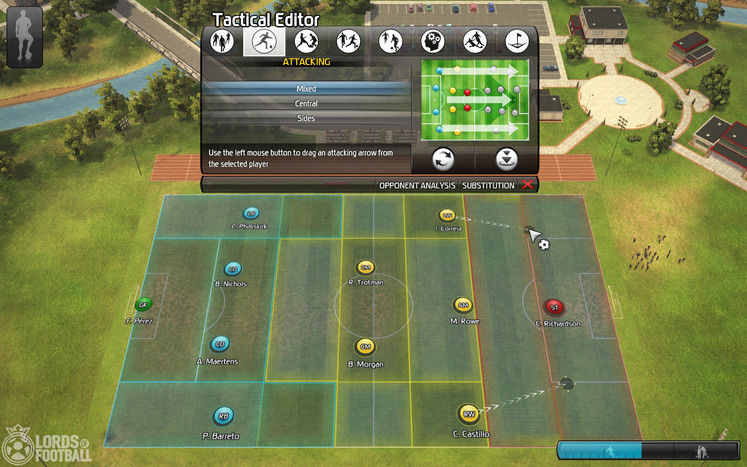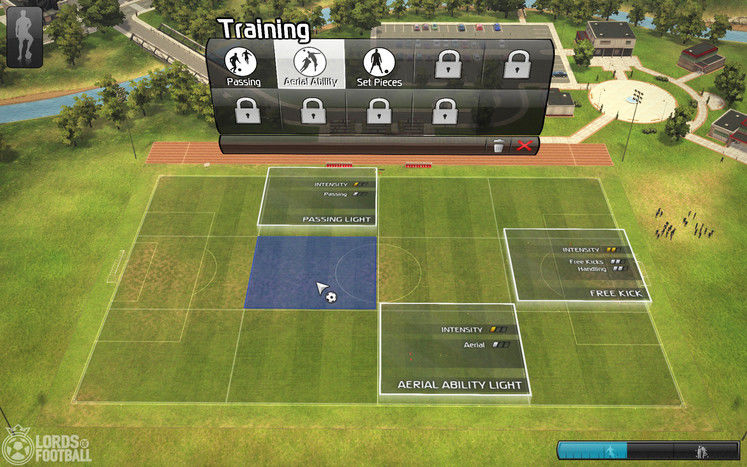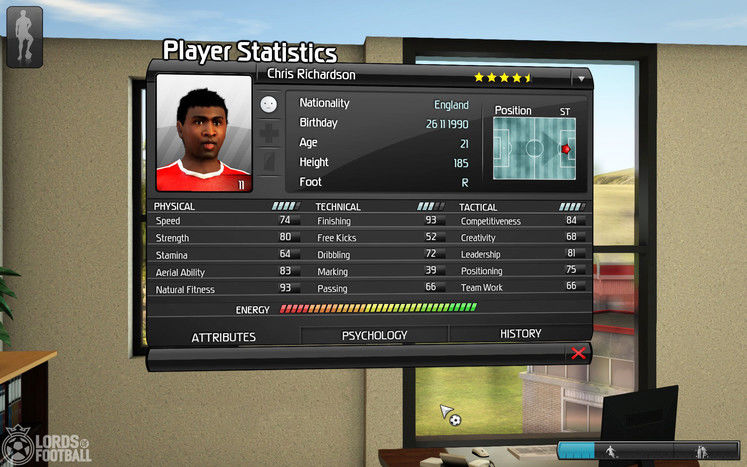Although the modern polished trifecta of FIFA, Football Manager and older-generation iterations of Pro Evo have undoubtedly raised the quality threshold, I think there’s still something to be said for introducing competition at the lower tiers and allowing innovative features to trickle into the genre under the radar. Lords of Football, although a fairly poor game overall, at least represents the rare sight of a properly-produced football simulation that isn’t emblazoned with a recognisable title. It’s compelling (for a while) precisely because of those reasons, but ultimately all the good will in the world can’t rescue Geniaware’s project as it shoots itself in the foot with simplistic design and repetitive gameplay.
 |
| The tactics editor is well-designed |
It’s a management title in the broadest sense of the word, but one that takes shape in the Sims mould, asking players to directly interact with their squad members and shape their lives both on and off the pitch. Colourful meters affecting their personality and playing skills are ripped wholesale from the Maxis’ template, and unsurprisingly for a title that features alcohol, gambling, ego-boosting and party addiction systems, this is a strictly unlicenced affair with randomised player names generated from a database that contains real-world surnames and fantastical alternatives like ‘The Jet’ or ‘El Magico’. In true 90’s style however, the in-game editor will allow you to create a custom Mario Balotelli or John Terry if you want to re-live their existing headlines.
If you’ve ever played Lionhead’s The Movies, there’s a rough analogue to be drawn between the way that game allowed you to interact with its walking egos and the manner in which Lords of Football allows you to deal with your gaggle of mega-rich man-babies. The first phase of every day takes place at the training ground, where the vast majority of time is spent dragging and dropping personnel between various physical, mental or recuperation tasks, each represented by buildings and facilities that gradually level up in proficiency and capacity as you meet various off-field and on-field goals set by the club director. Want your star striker to bulk up a bit or to expand your gym? Drag him to the building and let him work out. Want your wingers to build up some pace? Drag them to the running track and watch them sprint. Someone is knackered? Pick them up and drop them near the massage table. Rinse and repeat until the clock hits five.
At that point you can either keep your players in for extra training or let them hit the town to indulge their vices, which boils down to the exact same gameplay mechanic as daytime training only this time you’re dragging your players around nightclubs, pubs, restaurants and casinos to facilitate their every need for booze, food, partying, sex and ego-boosting public appearances. The more you entertain their every whim the happier they’ll be and the better they’ll perform as a team, but at the loss of the individual performance statistics which take a nose-dive as players spiral into addiction and red-top headlines.
This is where the majority of Lords of Football’s challenge exists. Give your players too much rope and they’ll eventually not bother turning up for training, instead choosing to spend their time starting an impromptu conga line, getting fat or attacking fans at the periphery of the facilities. Train them too hard and they’ll be persistently unhappy, at which point teamwork and individual performances plummet. Punishments and therapy are your mediating devices between the two, allowing players to be gradually weaned off their chosen addictions at the cost of time spent improving elsewhere in the facilities. No matter what you do it’s all the same interface, and you’re essentially just clicking through filters to get the groups of players you want, before dropping them down in a facility that suits their needs. Watch the graphs and happiness bars, look at the icon for their primary needs, move them again, etc.
Despite every player having an individual personality comprised of various physical and mental traits, those micro-management phases quickly become dull, and you can realistically experience the majority of the Lords of Football gameplay loop within the first hour. Training facility upgrades, challenges and unlocks are the dangling carrots for progression, but there’s a missed opportunity here to make you actually feel something for your squad members and gain a vested interest in their progression. That connection is what makes The Sims the experience it is, and the lack of empathy or interest is what cripples Lords of Football into tedium. As soon as you figure out the formula behind everything, your squad becomes a series of numbers and bars to fulfil as best you can; personalities are sidelined.
 |
| Develop those skills |
That leaves the actual nuts and bolts of the football itself, and unfortunately it’s an experience that mirrors the rest of the content in terms of depth and strategy, presenting a single match per in-game ‘day’ that cannot be sped up or slowed down once you take control. They can be simulated if you don’t fancy taking the reigns, but if you’re doing that I’m not entirely sure what the point of playing Lords of Football actually is.
Creating your formation is as simple as sliding players around a virtual pitch, and there are a selection of team-based tactical tweaks to tinker with according to your selected personal (passing style, counter-attack or not, width of play, etc...). Those broadly work as they should, and are accompanied by a series of micro-management options to apply automated tasks such as man-marking or defensive and attacking roles for individual players. Pausing the game allows you to spend part of a regenerating action meter to draw player runs, passes and shots in the style of Pro Evolution on the Wii, and there are a couple of all-hands-on-deck buttons to launch blistering counter-attacks or last-ditch defensive efforts.
On principle, that’s an interesting suite of tools with which to approach a simulated football match, but everything quickly falls apart when you see Lords of Football in action. There’s a reason that Football Manager took upwards of ten iterations before they even considered introducing a 2D abstraction of the pitch (let alone 3D), and that reason is ably demonstrated here. Ball movement and animation are strangely at odds with one another and players skid around the pitch in an erratic fashion, frequently taking a couple of touches in the opposite direction when receiving the ball, before remembering the direction they should be travelling. The micro-management of runs and passes is a good idea in principle (and one that I wanted utilise as frequently as possible), but players are so slow to react to instructions that it’s difficult put a plan into practice with any degree of precision.
So it’s all a bit floaty, imprecise and disconnected from the experience of actually watching a match. It’s not that Lords of Football had to be ultra-realistic of course - the mandate of the game is somewhat arcadey and and strange to begin with, but the experience of actually managing a game just isn’t very fun, no matter what level you approach it from.
 |
| His life, your decisions |
When combined with the day-to-day tedium of managing of your players, things aren’t too rosy. I’m convinced there’s a good experience to be had with Lords of Football if it was polished and developed with a few additional layers of player interaction and some form of hook to get you really interested in their day-to-day routine, but as it stands everything comes across as a little too shallow beyond those first couple of hours. It’s repetitive and once the novelty value of upgrading your facilities wears off, it’s more than a little dull.
As a curiosity project for fans of the genre, I can only say that I’m glad Lords of Football exists; but as a full-price release it’s not something that can be readily recommended.
LORDS OF FOOTBALL VERDICT
As a curiosity project for fans of the genre, I can only say that I’m glad Lords of Football exists; but as a full-price release it’s not something that can be readily recommended.
TOP GAME MOMENT
Developing a hardcore party addiction.




